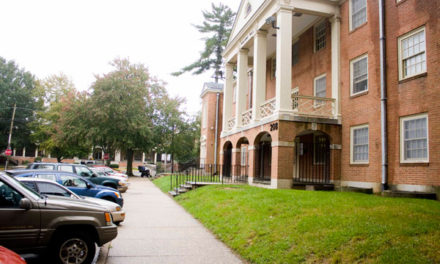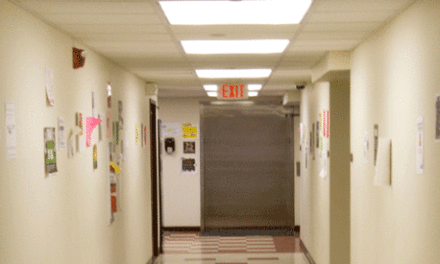By Kristen Griffith, The Whetstone
President of the Student Activities Board Korey Edmonds started a petition in the beginning of the semester protesting what student organizations had to go through to schedule a simple event.
“The process was too much,†he said. “You shouldn’t have to (schedule) four weeks in advance if you just want to book a classroom for a small presentation.â€
Students and faculty have complained about the event planning procedure, as well as the attitude of the reservations coordinator, Naomi Ruben. For some, reserving a room or filling out an event information form (EIF) have caused aggravation and delays. At least two professors said the delays and discouraging process negatively affect student retention.
Edmonds said he’s having trouble scheduling events in Wells Theater since a faculty-run play has it booked weekly.
“They booked Wells Theater for pretty much the whole semester for Tuesdays, Wednesdays and Thursdays, and it doesn’t stop until April 18,†he said.
Edmonds said Wells is a key place for events. Not being able to see the reservation and events calendar adds on to the difficulty.
“We don’t publish it because it’s constantly changing,†Tom Idnurm, director of facility management said about the event calendar. “Reservations are made under a first-come, first-serve basis.â€
He said the faculty member reserved Wells during the summer.
Idnurm said when rooms aren’t available, they help find others.
“Our goal, and you’ll even see this on many of (Ruben’s) emails, we want your event to be a success,†he said. “The more successes, the better it is for us because it’s less work for us.â€
However, students said they do not find them helpful.
“There’s always been an issue with reservations,†Moni Olowere, multicultural student union president and African student association vice president, said. “I hate the system.â€
Her complaints include double-booked rooms, not receiving approval confirmation for an event, and having to redo her EIF “for dumb reasons.â€
Nicole Sandiford, black student union secretary, said she had trouble working with Ruben, the reservations coordinator, during the summer and fall.
“She was extremely disorganized and would tend to put the blame on myself and the students I worked with,†she said. “She then tends to talk over you when you’re trying to explain to her what went wrong.â€
Edmonds said one way to improve the process is to have someone from Reservations available on campus. Ruben works from home for health reasons, Idnurm said.
Bianca Velazquez, Alpha Kappa Alpha sorority member, said someone needs to be on campus.
“It is always a lot easier to be able to sit down and physically explain your vision for larger events,†she said.
Professor Ron Douglas, a member of the faculty’s arts and culture committee, said he had issues with Reservations last semester.
“After we had the room confirmed, there was a response that the room was reserved for another event,†he said.
Destiny Hollis, president of the student government association, said she does not think Ruben plays a part in the event planning struggles.
“Things are not harder to organize now that she works from home,†she said. “There is a system in place where she receives all EIF forms and communicates through email.â€
Velazquez said her aggravations go beyond reserving rooms.
“Nothing is more frustrating than the day of your event or meeting and the door is locked to the space you need,†she said. “Especially after jumping through the various hoops of the EIFs.â€
Douglas said he also ran into problems with the status of the rooms. He said he automatically assumes the equipment in the room isn’t going to work since it has happened before.
He said there is no sufficient coordination between IT, maintenance and room reservations.
Idnurm said errors on the EIF, lack of communication and timeliness usually cause issues with event planning.
Although the EIF form must be submitted four weeks prior to the event, Idnurm said that only pertains to big events.
Dr. Angela D’Antonio, the faculty convener and an adviser for the Midnight Roast, said the form does not make that clear.
“The form is more flexible than people realize,†she said.
D’Antonio said the main problems surrounding the event planning process are communication, flexibility and the process.
D’Antonio met with Idnurm to discuss the event planning complaints and she said he assured her they want to work with students, faculty and staff to make sure events go well.
However, when Ruben was asked to comment on the same issues, including Ruben’s attitude toward students and faculty, Idnurm responded instead and accused the Whetstone reporter of “attacking†Ruben.
A few students from different campus organizations attended Wesley’s Service Awards ceremony March 28, and at the end of the ceremony, stood in front of the stage and voiced to all the faculty and staff in attendance their aggravations with event planning.
“Security was called, we were called protesters, I don’t understand all that,†Edmonds said. “But at the end of the day we felt that we had no one else to turn to, and everyone was in one room, so why not?â€
He said sometimes it’s necessary to do things people don’t approve of to get things done.
“Some people thought it was disrespectful, but the job got done,†he said.
The next day student leaders met in President Robert Clark’s office with other faculty and staff members to resolve the event-planning problem.
Evan Le’Mon, president of black student union, said one of the things they agreed on was a tracking system for the EIFs.
“Once we had them off to be put in the SGA mailbox, we don’t know where they are until we hear back from Naomi saying the event is approved, or not approved,†he said.
He said Idnurm suggested making an app.
Other suggestions included making the EIF process online, creating a waiting list for reserving rooms and putting the guest policy and noise permit in writing and adding it to the EIF.
“Tom said he doesn’t want to implement these this semester because it’s almost over and it’s just going to cause more confusion,†Le’Mon said.
Thiel College, one of Wesley’s peer institutions, has a smoother event-planning process.
“We can easily book a room, get the promotion going, talk to catering if there is food involved and really push it from there,†Than Oo, director of student activities and involvement, said.
Oo said they also have event forms students fill out but they often use an online tool called Wufoo, which is used for scheduling events.
“Online software can be very beneficial but sometimes very costly and impersonal,†Chief Financial Officer Christine Gibson, who supervises Idnurm, said. “The use of software, for example, would not change any of the approval or documentation requirements for events.â€
Oo said Thiel encourages early event planning submissions but they are flexible.
“We’ve done events, having them scheduled, catered and everything in a matter of 12 hours,†he said.
Oo said the financial process is simple as well.
“They can submit a form request or they can sign out a credit card and just bill it to their student account,†he said.
He said department heads and organization advisers sign off on financial actions instead of the CFO.
Douglas said he didn’t understand why a faculty event suddenly needed an EIF and approval.
“They were treating our faculty college-wide committee as if we were a student organization,†he said.
Douglas said he didn’t think No. 7 on the EIF’s procedures for scheduling events was relevant to the arts and culture events: “The vendor’s liability insurance certificate adding Wesley College as the additional insured.â€
“Some of the artists we brought in before are independent musicians, they don’t have insurance,†he said.
Douglas said it would have been impossible for the arts and culture committee to bring entertainment to campus if the school enforced that rule.
“All contracts should require the vendor to have general liability insurance during the entire time of a contract,†Gibson said. “Depending on the type of service the vendor is performing, additional service may be required.â€
No. 10 on the EIF’s procedures for scheduling events reads, “All the paperwork comes to the Reservations Office. Once all the information and documents are received and in order they will go to Dr. Christine Gibson, CFO, and she will sign off on contracts, check requests and purchase orders for the event.â€
Dr. James Wilson, who serves on the arts and culture committee, said this policy was created last year.
Wilson said he’s been on the committee for years and never had to do this. He said the CFO should ask a question before creating these policies: “Does this limit the educational experience of our students?â€
“If we are making Wesley a less attractive and less effective place for students to live and learn, than we are shooting ourselves in the foot by giving in to this culture of litigation paranoia,†he said.
Â




